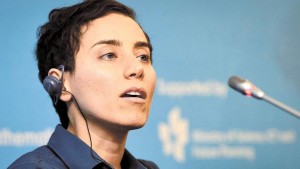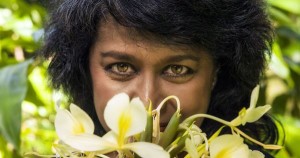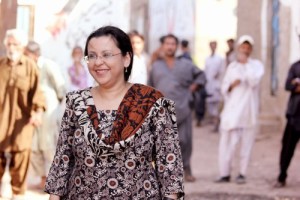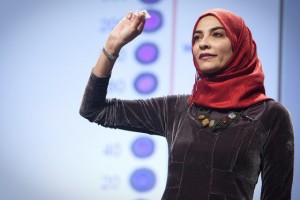
By The Editorial Team of localhost/muslim
Last January, localhost/muslim recognized the Top-20 Most Influential Women in Science in the Islamic World. This year, we recognize the achievements of Women who made ground breaking discoveries, broke glass ceilings, and won international honours last year. 3 of these 5 five women were honoraries last year as well and they went on to achieve great things this last year. Here are their stories:
Maryam Mirzakhani: Breaking the Glass Ceiling
 On August 13, Maryam Mirzakhani, a professor of mathematics at Stanford University, was awarded the 2014 Fields Medal at the International Congress of Mathematicians, held in Seoul, South Korea. Dubbed as the ‘Nobel Prize of Mathematics,’ the Fields Medal was established in 1936 and is given once every four years. Mirzakhani is the first woman ever to win the prize.
On August 13, Maryam Mirzakhani, a professor of mathematics at Stanford University, was awarded the 2014 Fields Medal at the International Congress of Mathematicians, held in Seoul, South Korea. Dubbed as the ‘Nobel Prize of Mathematics,’ the Fields Medal was established in 1936 and is given once every four years. Mirzakhani is the first woman ever to win the prize.
Mirzakhani was awarded the Fields Medal for her original contributions to the fields of dynamical systems and geometry. Dynamics is the abstract study of change and motion over time. It is the mathematics, for instance, that governs the motion of planets that experience each other’s gravitational force, which is simple and described by the Newton’s Laws developed in the 17th Century but also more complex phenomenon that happens when a third (and fourth) body is introduced in the system.
The genius of Mirzakhani’s work lies in addressing these and more complex challenges, as described by Jordan Ellenberg, a professor of mathematics at University of Wisconsin:
“Among other things, she studies billiards. But now, in a move very characteristic of modern mathematics, it gets kind of meta: She considers not just one billiard table, but the universe of all possible billiard tables. And the kind of dynamics she studies doesn’t directly concern the motion of the billiards on the table, but instead a transformation of the billiard table itself, which is changing its shape in a rule-governed way; if you like, the table itself moves like a strange planet around the universe of all possible tables.”
Such ‘transformation’ allows for an understanding of the symmetry of curved surfaces, such as spheres or doughnuts. Mirzakhani’s research is bold – it lies in the realm of pure mathematics which, nevertheless, has implications on the questions relating to the origin of universe, physics, and quantum field theory.
Mirzakhani was born and raised in Tehran towards the end of the drawn-out Iraq-Iran war. Initially interested in writing and reading novels, Mirzakhani developed a fascination with mathematics, landing her as the first female member of the Iran’s International Mathematical Olympiad team at the age of 17. She won the gold medal in her first year, and returned the next year to win another gold medal by achieving a perfect score. Encouraged by her strong teachers, she went on to pursue her undergraduate education in mathematics at the Sharif University in Tehran.
Once at Harvard for her graduate work, Mirzakhani was mentored by Curtis McMullen – a recipient of Fields Medal in 1998 – as her doctoral advisor. The fascination with hyperbolic surfaces, which would culminate in a Fields Medal for Mirzakhani, started in the informal seminars of McMullen, exemplifying the deep influence her advisor exerted over her academic ambitions. Describing his influence as ‘huge,’ Mirzakhani humbly wishes that she should have ‘learned more from him.’
Married to a Czech theoretical Computer Scientist and mother to a 3-year old daughter, Mirzakhani defines her journey from the streets of Tehran to the ceremony in Seoul, as one of tenacity and curiosity.
Ameenah Gurib-Fakim: The Daughter of the Soil
 Dr. Ameenah Gurib-Fakim has recently been at the center of exciting new developments in the small island state of Mauritius where she was the Presidential Candidate of an opposition political party that won the recently held General Elections. While the Elections do not directly concern the position of the President of the Republic, in due course, Ameenah may – if she takes over this position – become the first woman scientist to ever become the President of a country.
Dr. Ameenah Gurib-Fakim has recently been at the center of exciting new developments in the small island state of Mauritius where she was the Presidential Candidate of an opposition political party that won the recently held General Elections. While the Elections do not directly concern the position of the President of the Republic, in due course, Ameenah may – if she takes over this position – become the first woman scientist to ever become the President of a country.
Dr. Ameenah Gurib-Fakim has earned distinction by studying plant life in this one of the world’s most important biodiversity spots. Her fascination with science started in her high school; under the guidance of dynamic teachers in high school. She went to the United Kingdom where she did her undergraduate degree from the University of Surrey followed by a doctorate in Chemistry from the University of Exeter, UK. Instead of applying her research talents abroad, Dr. Gurib-Fakim chose to return to her home to take up a lectureship in Organic Chemistry at the University of Mauritius. Describing her decision to return, Dr. Gurib-Fakim explains:
“After my PhD, I was all set to do a postdoc in the US but chose instead to return to Mauritius where I applied my research training in synthetic organic chemistry to a completely new area: Phytochemistry. This migration was vital because I could be productive academically within one of the world’s unique hotspots of biodiversity.”
In 2004, Dr. Gurib-Fakim was appointed as the Dean to the Faculty of Science at the University of Mauritius. The period of 2006-2010 saw Dr. Gurib-Fakim as the Pro-Vice Chancellor for the Teaching and Learning at the University of Mauritius. Today, Dr. Gurib-Fakim spends her time fulfilling the responsibilities of Managing Director of the CEPHYR, which is a Centre for Phytotherapy Research and development. The Centre carries out studies on the rich plant life of the region – which has implications in fields as diverse as cosmetics, nutrition, pharmaceutics, and therapy.
Dr. Gurib-Fakim was the co-author of first of its kind African Herbal Pharmacopoeia – the first edition was released in 2010. It consists of comprehensive botanical, commercial and phytochemical information on over fifty of the most important African medicinal plants.
Her research has resulted in co-authorship of more than twenty books, and nearly 80 articles in her field. Moreover, she has led projects for global organizations such as the United Nations, World Bank, and the European Union. Dr. Gurib-Fakim has received many national and international honors including being appointed Commander of the Order Star and Key of the Indian Ocean, the highest honor of Mauritius, in 2008 and became a Knight of the Order of Academic Palms in 2009.
In 2014, Dr. Gurib-Fakim also spoke at TED where her talk focused on the vital role of medicinal plants and the likely loss to the planet of the extinction of certain relatively less known plant varieties only found in her home island of Mauritius.
To watch the video, please click here.
Anita Zaidi: Giving Back to the Community
 In December 2013, a Pakistani pediatrician, Dr. Anita Zaidi, won the $1 million Caplow Children’s Prize from amongst 550+ entries including from major organizations such as Doctors Without Borders. The purpose of the competition was to find innovative and cost-effective ways to reduce early child mortality rates.
In December 2013, a Pakistani pediatrician, Dr. Anita Zaidi, won the $1 million Caplow Children’s Prize from amongst 550+ entries including from major organizations such as Doctors Without Borders. The purpose of the competition was to find innovative and cost-effective ways to reduce early child mortality rates.
The Caplow Prize was given to transform Rehri Goth – a small fishing town on the outskirts of Karachi, Pakistan, where 11 children out of 100 don’t survive past the age of five and one woman out of every six living in the area has lost at least one child.
Dr. Zaidi plans to “change people’s [attitude] towards planning for delivery [of babies], [secure a] transport emergency fund, [provide] nutrition support to expectant women, vaccines, and also impart an 18-month training to five women at AKU’s School of Nursing and Midwifery.”
In 1988, Dr. Zaidi graduated as the member of the first graduating class from the Aga Khan University in Karachi, Pakistan and later spent a year in the Pakistan’s Northern Areas (now Gilgit-Baltistan) doing community outreach and service. Dr. Zaidi describes her time in the region as “the year [when] I learnt the most about Pakistan and the problems children living in impoverished environments [face].” After a year, Dr. Anita Zaidi moved to the United States to receive instruction in paediatrics, microbiology, infectious diseases and epidemiology at Duke University and Harvard University.
After a decade in the US, Dr. Zaidi decided to leave her faculty position at Harvard to join her alma matter – Aga Khan University. In 2010, she became the head of the paediatrics department. Reflecting on her decision to move back to Pakistan, Dr. Zaidi argues that it was motivated by the desire to give back to the society – “when you have been given so much by your nation, you have the responsibility to give back.”
Dr. Zaidi’s research at the Aga Khan University has been focused on improving the diagnostic methods and tools for detecting infectious agents in children, on neonatal infections in hospital and home-born babies and the characterization of childhood pathogens.
Pardis Sabeti: The Rockstar Scientist
 Dr. Sabeti headed a team of researchers in 2014 who used advanced genomic sequencing technology to identify “a single point of infection from an animal reservoir to a human in the current Ebola outbreak in West Africa.” In addition, the research also revealed the dynamics of the human-to-human transmission of Ebola virus and the mutations in the genetic code of the virus as it adapts to its human hosts.
Dr. Sabeti headed a team of researchers in 2014 who used advanced genomic sequencing technology to identify “a single point of infection from an animal reservoir to a human in the current Ebola outbreak in West Africa.” In addition, the research also revealed the dynamics of the human-to-human transmission of Ebola virus and the mutations in the genetic code of the virus as it adapts to its human hosts.
The discovery came through an extensive analysis of the genetic makeup of Ebola samples of survivors living in the affected regions. The strain responsible for the largest outbreak of Ebola was identified as a closely-related strain found in Central Africa in 2004. It demonstrates the movement of the strain from Central to West Africa over a decade. Further, it identified a series of mutations that arose as the outbreak spread – some of it alter the biological state of the virus, which is helpful to continually evolve to adapt to human immune systems. This highlights the need for continuous monitoring of the changes in the virus, and may lead to improved diagnostic methods and vaccines.
Dr. Sabeti is a computational biologist, medical geneticist, and evolutionary geneticist and an associate professor in the Center for Systems Biology and Department of Organismic and Evolutionary Biology at Harvard University. Dr. Sabeti is also on the faculty of the Center for Communicable Disease Dynamics at the Harvard School of Public Health, and is a senior associate member at the Broad Institute.
Pardis Sabeti was born in Tehran, Iran in 1975. Following the Iranian Revolution, the family moved to Florida. Dr. Sabeti received her undergraduate education at MIT where she graduated with a Bachelor of Science studying biology, and where she was the class president as well as being on the team of varsity tennis. As a Rhodes Scholar, she went to Oxford University in the United Kingdom to study human genetic resistance to malaria, completing her doctorate in evolutionary genetics in 2002. In 2006, she graduated summa cum laude from the Harvard Medical School with a Doctor of Medicine.
In her spare time, Dr. Sabeti is the lead vocalist and bass player for the Indie rock band Thousand Days, which received an honorable mention by the Billboard World Song Competition. The group’s fourth album has been delayed due to Dr. Sabeti’s work on the Ebola outbreak.
Hayat Al Sindi: The STEM Role Model
 In 2014, Dr. Hayat Al Sindi was recognized by US Department of State as among the Women in Science Hall of Fame for Middle East and North Africa. Moreover, in the annual meeting of the Clinton Global Initiative in September 2014, Dr. Sindi was awarded the ‘Leadership in Civil Society’ prize.
In 2014, Dr. Hayat Al Sindi was recognized by US Department of State as among the Women in Science Hall of Fame for Middle East and North Africa. Moreover, in the annual meeting of the Clinton Global Initiative in September 2014, Dr. Sindi was awarded the ‘Leadership in Civil Society’ prize.
The first Gulf woman to receive a doctorate in biotechnology from Cambridge University, Dr. Sindi’s story is one of defeating the odds. As a teen, she left Mekkah to study in England – fearing that her father may not allow otherwise, Dr. Sindi convinced her father that she’d already been accepted into a prestigious university in England. When she got to the United Kingdom, she had no university place and didn’t speak a word of English. Through persistence, she landed herself a place in the King’s College, Cambridge. Following her PhD from Cambridge, she taught at the International School of Medicine. As a visiting scholar at Harvard in 2007, Dr. Sindi was part of the team that founded Diagnostics for All– a non-profit organization dedicated to creating innovative, inexpensive, point-of-care diagnostics tools for people in underdeveloped areas. Dr. Sindi has developed a diagnostic tool for early detection of breast cancer as well as the Magnetic Acoustic Resonance Sensor (MARS), which combines light and sound for use in biotechnology.
Dr. Sindi’s work earned a spot with four other scientists in a documentary supported by the Executive Office of the President of the United States aimed at promoting science education among young audiences. In addition, Dr. Sindi won the Mekkah Al Mukaramah prize for scientific innovation in 2010 – the prize was awarded by the HRH Prince Khalid bin Faisal. National Geographic named her as the Emerging Explorer in 2011.
UNESCO has appointed Dr. Sindi as the UNESCO Goodwill Ambassador for her work in promoting science education, in particular among girls, in the Middle East. In the same year, Newsweek named her as one of the 150 women who shook the world. Dr. Sindi continued to break new ground by becoming a part of the first group of women to serve in the Saudi Arabia’s Consultative Council.
With such a distinguished career, Dr. Hayat Sindi is one of the most illuminating role models for countless young female students of science in the Middle East.
You must be logged in to post a comment.